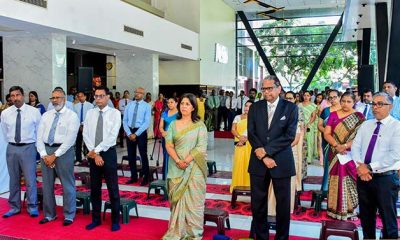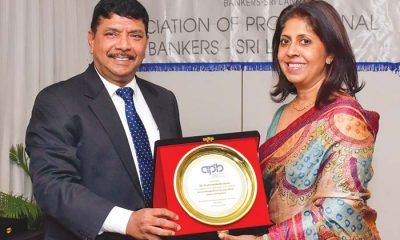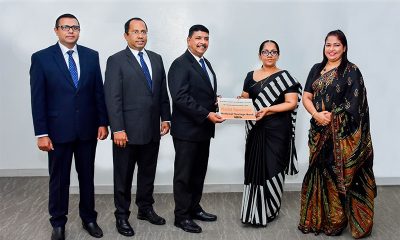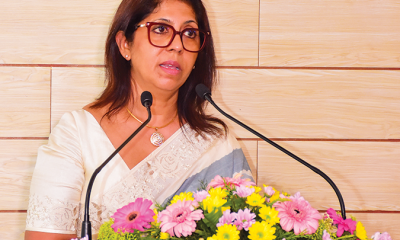Business
‘NSB continued to prove its resiliency within economic shudder’
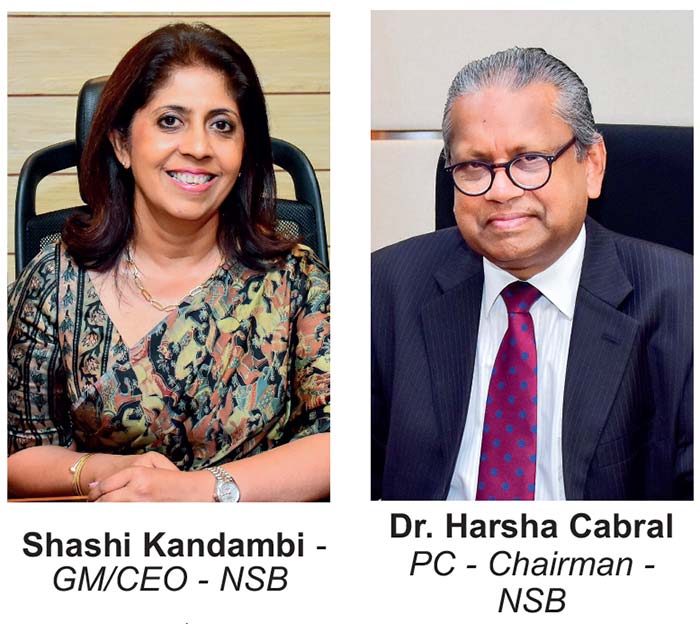
Rs. 1.7 Tn Asset base
Rs. 1 Tn investment base
Rs. 1.5 Tn Deposit base
Impaired Loans (Stage 3) Ratio 2.41% (net of stage 3 impairment)
Gross Income raised by 33% YoY
The year 2023 was another challenging year for almost all the sectors of the economy specially the banking sector. Grappling with aftermath of pandemic followed by largest economic crisis in post-independence history, and socio-political uncertainties and monetary tightening, National Savings Bank including all the other banks faced their toughest financial year.
Being a licensed specialized bank with limited financial market opportunities, NSB demonstrated its mettle by recording a Profit after Tax (PAT) of Rs. 7.2 billion for the fiscal year ended December 31, 2023, a testament to its adept management and highly skilled workforce.
The Banks’ achievement of Rs. 7.2Bn PAT was mainly surged by 31% increment of Interest Income. The Bank strategically allocated more than 60% of its customer deposits investing in Government Debt Securities capitalizing on the higher interest rates prevalent in 2022. This prudent investment strategy yielded a substantial interest income of Rs. 137.7Bn which was an upswing of 36%. Interest received through Loans and Advances also grew by 36.3%, an increment of Rs. 23.4 Bn.
Net Gain from trading rose up to Rs. 3.7Bn at the group level which was a 206% increase from last year where we recorded a loss from trading. However, NSB was able to turn around the situation with professional due care and commitment, underscoring NSB’s adeptness in capitalizing on market opportunities.
The Bank however, encountered challenges in net fee and commission income, witnessing a 34% decline due to subdued demand for loans and advances amid higher interest rates then prevailed. Fee and Commission Income was mostly contributed from Retail Loans and Corporate Banking. Both lines of business were clogged due to unwholesome micro financial conditions.
Exceeding the growth rate of Interest Income, the Interest Expense of the Bank also increased by 41% year-over-year (YoY). This rise in the cost of funds, particularly from Fixed Deposits which represent the largest portion (81%) of NSB’s deposit base, contributed to a congestion in the positive growth of Net Interest Income due to the lag effect of liability repricing.
Impairment charges of the Bank decreased by 12% on 2023 compared to the same period last year. The Bank closely monitors and considers the impact of economy to business operations and performance.
In terms of Asset Quality, with all the obstacles, NSB has one of the lowest Impaired Loans (Stage 3) Ratio 2.41% (net of stage 3 impairment) compared to the industry rate of 7% at the end of year fiscal year 2023. Further, the Bank maintains above industry impairment coverage ratio of 53.3%.
Personnel and other expenses were increased by 17% and 16% respectively being in consistent with inflationary situations globally. The Bank recorded a PBT of Rs. 4.3 Bn which was a 5% decrease from the last year. Recording deductible temporary difference of Differed Tax there was a credit of Rs. 2.5 Bn to Income Tax Reversal and created differed tax asset. Accordingly, the Bank was able to spot Rs. 7.2 Bn PAT.
Despite the challenges posted by micro financial conditions and moving to low-interest-rate set-up, the Bank was able to grow its deposit base by Rs. 5.8Bn. On the back of 100% ownership of Government of Sri Lanka (GoSL) and the 100% explicit guarantee provided by the GoSL for the money deposited with the Bank and the interest thereof through the National Savings Bank Act, NSB continued to assure the customer confidence on their deposits.
The Bank’s investment portfolio grew by Rs 62.4Bn amidst the low demand for loans and receivables and the Bank’s strategic move to flow its interest earning assets to a most profitable alternative available. As perfectly described earlier these investments in Government Securities could earn Rs. 137.7Bn Interest Income. Surpassing the industry average of Investment to Total Asset Ratio of 35.8%, NSB recorded 62.4% in 2023.
Total Asset base remarked to Rs. 1.7Tn on 2023 showing a markup of 4% compared to last year. The Bank generated 9.36% of ROE and 0.26% of ROA (Before Tax) in 2023.
The Bank maintained highly liquid asset portfolio when compared with the banking industry. Surpassing the minimum requirement of 20%, NSB has 55% of Statutory Liquid Asset Ratio where the industry average is 44.9% at the end of the year 2023. Liquidity Coverage Ratio (All currency) of NSB is 293.7% which is far more than the minimum requirement of 100% at the end of the year 2023.
The Bank is cushioned adequately to cover potential losses to protect the interests of the Bank’s depositors and other lenders. Accordingly, NSB marked well above regulatory minimum in terms of Capital Adequacy Ratios. The Banks’ Common Equity Tire 1 Capital Ratio was 15.3% at the end of 2023 (minimum requirement -7%) where industry score was 13.4%. Tier 1 Capital Ratio of NSB was 16.9% (minimum requirement – 8.5%) where industry score was 13.8% at the end of 2023. Total Capital Adequacy Ratio of NSB at the end of 2023 was 19.3% where the industry marked it to 16.9%.
As such, NSB continued to stamp its position as “Safest Bank in Sri Lanka” in every aspect such as liquidity, balance sheet management, performance and credit and market risk management. The Lanka Rating Agency (LRA) has assigned the Bank with the issuer rating of [SL] AAA with Stable Outlook. The Bank has been awarded the 6th most valuable brand in Sri Lanka by the Brand Finance Lanka Ltd on 2023. NSB also ranked among the Top 10 Women Friendly Workplaces in Sri Lanka for third consecutive year on 2023.
(NSB)
Business
Arvind Subramanian: Why hasn’t Sri Lanka’s democracy acted as a hedge against economic chaos?
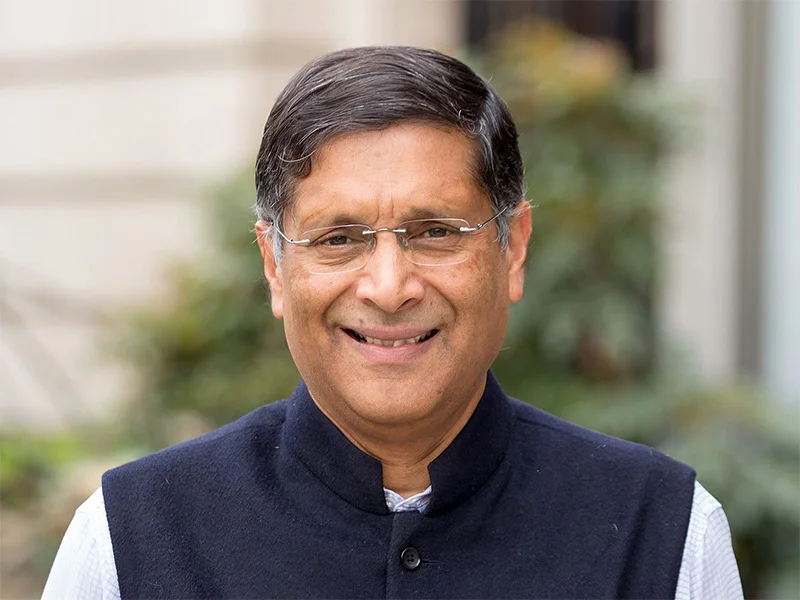
In a sobering and intellectually provocative lecture delivered yesterday at the Central Bank of Sri Lanka, Dr. Arvind Subramanian, former Chief Economic Advisor to the Government of India, posed a “haunting” question to the nation’s policymakers: Why has one of the world’s oldest democracies outside the West failed to leverage its political system to ensure economic stability?
Titled ‘Reviving Growth While Maintaining Stability,’ the lecture moved beyond technical prescriptions. Dr. Subramanian, now a Senior Fellow at the Peterson Institute for International Economics, admitted that his experience with the complexities of the Indian economy had made him “humble and somber,” leading him to focus on the broader socio-political structures that dictate a nation’s fate.
Dr. Subramanian argued that in India, democracy acted as a vital pressure valve that prevented both extreme political violence and economic chaos. He noted that while the process of nation-building is historically violent – citing the West’s decimation of populations and China’s estimated 40–75 million deaths between 1950 and 1976 – India managed to maintain a relatively low degree of mass violence.
“Democracy had a key role to play in that,” he asserted. “It is one of India’s major achievements.”
The speaker extended this logic to the economic sphere, suggesting that Indian democracy created a “societal demand” for low inflation.
In India, he noted, there is a pervasive political belief that if inflation crosses the 5 percent threshold, the government is likely to lose the next election. This political accountability forced the Central Bank and the State to maintain macro-stability.
The crux of Dr. Subramanian’s address was the “intellectual puzzle” of why Sri Lanka, which received universal franchise well before India, did not experience the same stabilising effects of democracy.
He presented two charts that he described as “haunting.” The first revealed that Sri Lanka has spent 60 percent of its time under IMF programmes, indicating a state of “perennial macro-economic stress.” In contrast, India has not sought an IMF programme in the 35 years following its 1991 reforms.
“Why does Indian society demand low inflation and macro-stability, while the same doesn’t happen in Sri Lanka?” he asked. Despite its long democratic tradition, Sri Lanka has consistently seen higher inflation and greater financial instability than its neighbour.
Dr. Subramanian also highlighted a stark difference in how both nations treat foreign capital. Pointing to data on external debt stock as a share of Gross National Income (GNI), he illustrated that Sri Lanka has been consistently and significantly more reliant on foreign capital than India or China.
While some argue that Sri Lanka’s small size necessitates a reliance on foreign capital, Dr. Subramanian remained unconvinced, noting that India also suffered from low domestic savings for decades but chose a more cautious path.
“India has been much more cautious in opening up to foreign capital,” he explained. While foreign capital can drive growth, it brings the “downside of risk and volatility” as capital flows in and out – a reality that came to haunt Sri Lanka in recent years through its high exposure to foreign currency-denominated debt.
The lecture concluded not with a list of “1, 2, 3 points” for recovery as the wider audience had expected, but with a challenge to the Sri Lankan intelligentsia. If democracy is meant to be a safeguard against political and economic disorder, the breakdown of that mechanism in Sri Lanka requires deep introspection.
“Different societies differ,” Dr. Subramanian concluded. “But if democracy had a key role in avoiding volatility in India, why shouldn’t it have been so in such an old democracy as Sri Lanka? It is worth pondering over,” he said.
By Sanath Nanayakkare
Business
HSBC kicks off ‘Clean Waterways’

HSBC will launch ‘Clean Waterways’ in partnership with the Beira Lake Restoration Task Force that was convened by the Governor of the Western Province to restore Beira Lake. HSBC in partnership with Clean Ocean Force will build and operate two solar powered, zero emission, waterway cleaning boats, which are the first of their kind in Sri Lanka. They will be used extensively in support of restoring the Beira Lake ecosystem and its surrounding environment.
Once a picturesque centerpiece in Colombo, Biera Lake is now suffering from significant pollution. Urbanization and lack of effective waste management practices have led to large volumes of plastic and floating organic debris, untreated sewage and industrial effluents contaminating the water. Resultant algal blooms, unchecked hyacinth growth and water stagnation further give the lake a detrimental odour and appearance. The pollution has degraded water quality, harmed aquatic life posing health risks to residents living in proximity by attracting disease-carrying fauna.
The Biera Lake Restoration Task Force was convened by the Governor of the Western Province with the purpose of delivering cleaner waterways in the urban environment. It is vital to educate and support change for communities that reside near the Beira Lake. To achieve this, a dedicated community outreach programme will reach over 5000 wider residents through awareness building and education which is anticipated to reduce ‘waste at source’.
Mark Surgenor, Chief Executive Officer, HSBC Sri Lanka stated “With over 130 years presence in Sri Lanka, HSBC understands the importance of Beira Lake to Colombo’s urban environment. Supporting cleaner waterways is a vital step towards restoration of that environment. Through this first ever public-private partnership, multiple stakeholders are coming together to work towards restoring this iconic lake. We have committed to support the Beira Lake Restoration Task force, not just with the much-needed funding, but also bringing best practices through our experience with similar projects in other markets that we operate in. The community outreach programme planned alongside the project is a critical step towards making this impact sustainable. HSBC has always been at the forefront of innovation in Sri Lanka and we look forward to continuing that for our next 130 years here”
Business
CORALL Conservation Trust Fund – a historic first for SL
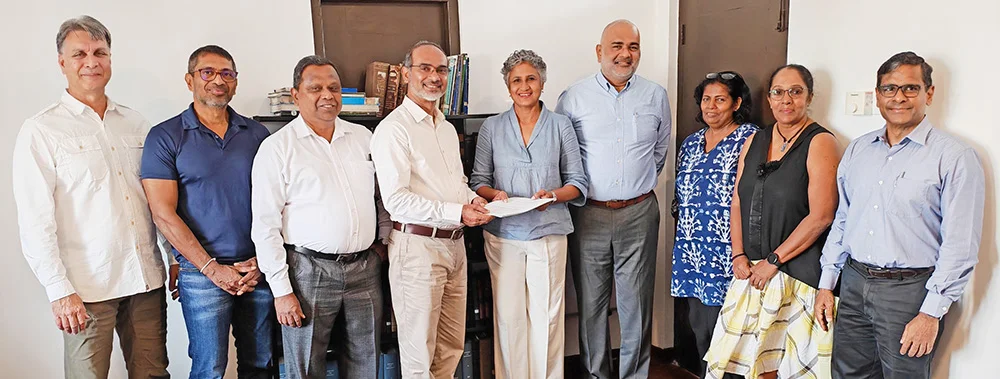
Sri Lanka has moved to strengthen the financial backbone of its marine conservation efforts with the establishment of the country’s first CORALL Conservation Trust Fund, a landmark initiative that positions coral reef protection firmly within the framework of sustainable finance and long-term economic value creation.
The Trust Deed establishing the CORALL (Conservation of Reefs for All Lives and Livelihoods) Conservation Trust Fund was signed on December 31, 2025, by Environment Foundation (Guarantee) Limited (EFL) as Settlor together with the inaugural Board of Trustees. The Fund is designed to support the conservation of Pigeon Island National Park, Bar Reef Marine Sanctuary and Kayankerni Marine Sanctuary, along with their associated seascapes—areas that are central not only to marine biodiversity but also to fisheries, tourism and coastal protection.
From a business and policy perspective, the Trust Fund represents a decisive shift away from short-term, donor-driven conservation projects towards a structured and enduring financing mechanism. It is a key component of the Sri Lanka Coral Reef Initiative (SLCRI), a six-year national programme funded by the Global Fund for Coral Reefs and implemented by the International Union for Conservation of Nature (IUCN), but critically, the Trust itself is structured to continue well beyond the project’s lifespan, offering a permanent vehicle for mobilising state, private sector and international sustainability-linked funding.
Coral reefs within the three targeted seascapes have been increasingly degraded by destructive fishing methods such as blast fishing, overfishing, coastal pollution, unregulated tourism and unplanned coastal development. These pressures carry significant economic consequences, undermining fish stocks, tourism revenues and the natural coastal protection that reefs provide. Project partners note that a major driver of this degradation is the limited understanding among communities and institutions of the true economic value of coral reefs as natural capital that underpins livelihoods and resilience.
EFL, as an implementing partner to IUCN, played a central role in shaping the Trust’s institutional and financial architecture. It carried out a comprehensive legal, policy and institutional review, provided recommendations on the structure of Conservation Trust Funds, and drafted both the Trust Deed and an operational manual embedding governance, accountability and transparency safeguards. These features are seen as critical in building investor and donor confidence, particularly at a time when environmental, social and governance (ESG) considerations are increasingly influencing capital flows.
The Board of Trustees, selected by IUCN and the SLCRI National Steering Committee following a public call for applications, brings together expertise from investment banking, commercial banking and marine science. The Trustees—Palitha Gamage, Prof. (Ms.) Sevvandi Jayakody, Nalin Karunatileka, Dr. (Ms.) Nishanthi Perera, Chanaka Wickramasuriya and Nishad Wijetunga—will oversee grant funding for conservation and restoration proposals submitted by Special Management Area Coordinating Committees, while also ensuring robust monitoring and evaluation to safeguard long-term financial and ecological sustainability.
“This marks a significant step in sustainable financing to conserve coral reef ecosystems which are critical for marine biodiversity conservation, coastal protection, climate resilience, and the livelihoods of coastal communities, said Dr. Shamen Widanage, Country Representative of IUCN Sri Lanka, highlighting the wider economic and social returns expected from the initiative.
EFL chairperson Deshini Abeyewardena said the Trust Fund reflects a broader shift towards innovative financing models for environmental protection.
“EFL is honoured to have been selected by IUCN to implement this landmark initiative. The establishment of the CORALL Conservation Trust Fund reflects EFL’s long-standing commitment to advancing environmental justice through strong governance, legal safeguards and innovative financing mechanisms. As Sri Lanka faces increasing pressures on its marine ecosystems, this Trust provides a credible and transparent platform to secure sustained investment for coral reef conservation, she said.
By Ifham Nizam
-

 Editorial4 days ago
Editorial4 days agoIllusory rule of law
-

 News5 days ago
News5 days agoUNDP’s assessment confirms widespread economic fallout from Cyclone Ditwah
-

 Editorial5 days ago
Editorial5 days agoCrime and cops
-

 Features4 days ago
Features4 days agoDaydreams on a winter’s day
-

 Editorial6 days ago
Editorial6 days agoThe Chakka Clash
-

 Features4 days ago
Features4 days agoSurprise move of both the Minister and myself from Agriculture to Education
-

 Features3 days ago
Features3 days agoExtended mind thesis:A Buddhist perspective
-

 Features4 days ago
Features4 days agoThe Story of Furniture in Sri Lanka






